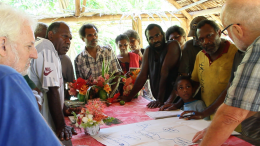
Vanuatu – Most farmers around the world feel that their buyers are giving them a pretty bad deal. In Vanuatu, the smallholder organic pepper farmers of the island of Malo were no exception. They worked hard to grow their crop and support their families but never seemed to get paid what they felt was right. This feeling was made worse when they heard about the high price organic pepper retails for in the shops in Port Vila.
Then in 2014, the organic pepper farmers of Malo attended some training organised by Farm Support Association and the Pacific Island Farmers Organisation Network. The training introduced them to the value chain way of thinking about agriculture and how to see themselves as one of several necessary links in a long chain that takes the product from the farm to the table.
Importantly, the organic pepper buyer, Piero Bianchessi of Venui Vanilla, was also part of the value chain training. He was able to directly explain to the participants the entire process of pepper processing and retailing. With a better understanding of all the steps and costs that were involved after the pepper left their farms, they could now understand why they received only a small portion of the final retail price. Maybe they still were not entirely happy with their share, but at least they now understood where all the money was going.
Additionally, by talking with Piero, the farmers were able to make him aware of all the difficulties they faced in producing the pepper, and in turn, learn how their farming practices affected the quality and usability of the pepper. Together, they were able to immediately work on some of the issues that were affecting the quality of the crop and come to an understanding about how improved quality of the pepper on the farm would lead to less risk for the buyer and more money for everyone.
By the end of the workshop, the farmers not only had a better understanding of the entire pepper value chain and their role in it, but they also knew the buyer as a person. Piero had been very open in discussing his business, and trust had started to grow between them.
Going back to their farms, the improved techniques they learned at the workshop were put into practice, but the farmers also found themselves working with fresh enthusiasm, because they no longer felt that the buyer was ripping them off. Instead, they were all trying their best to make a living and everyone had a part to play to make sure everybody got paid.
Six weeks after the training, Piero could see a marked improvement in the quality and quantity of pepper he was being supplied with. He put this down to the value chain training and the new level of understanding and respect between farmer and buyer that resulted from a participatory approach to conducting the value chain analysis. #
About MTCP2
The Medium-Term Cooperation Program Phase 2 (MTCP2), a five-year capacity building program supported by the International Fund for Agricultural Development (IFAD), the Swiss Agency for Development and Cooperation (SDC), and the European Union (EU), has been implemented in 19 countries across three sub-regions—Southeast Asia, South Asia, and the Pacific—engaging 1,544 sub-national farmers organizations (FOs) with a total membership of around 22 million farmers. The funding support (total budget of $ 5 million for the whole duration of the project across 19 countries) serves as a catalytic fund that will allow FOs to enhance their capacity to be effective channels of economic services to farmers. The program has contributed to the formation of the strong national platform of FOs with improved capacity to engage in policy processes and mobilize resources from mainstream agricultural development programs like extension services, credit, and pre and post-harvest facilities. The program also helped in transforming farmers’ associations into commodity-based cooperatives to strengthen the role of small-scale farmers within an inclusive and sustainable value-chain. The program is being implemented by the consortium Asian Farmers’ Association for Sustainable Rural Development (AFA) and La Via Campesina (LVC).

Comments are closed